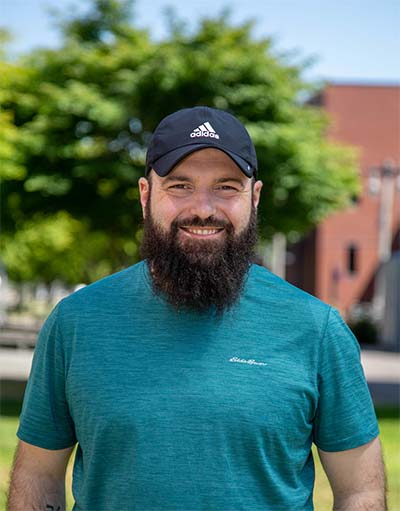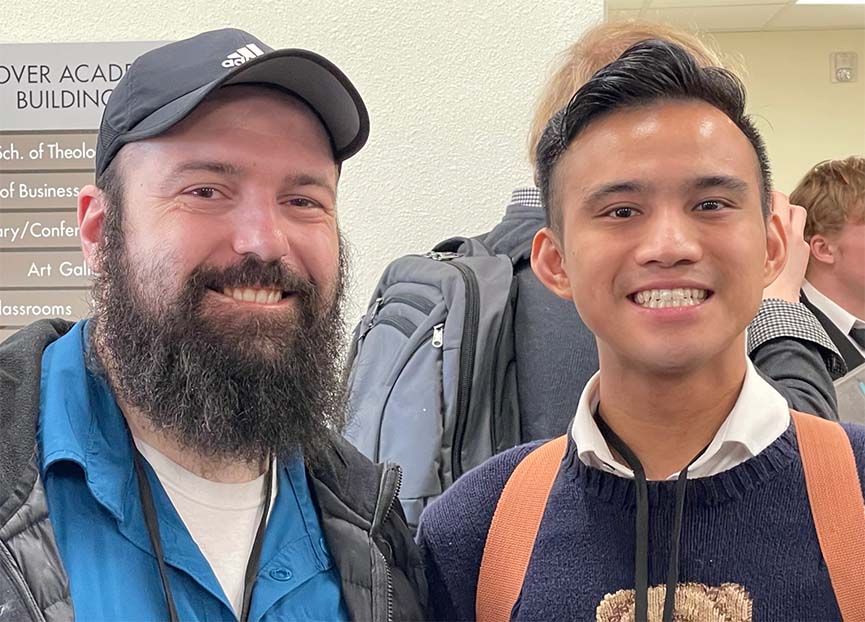
Phillip Dontje: For the Love of Math
When not delving into algebraic topology, Army veteran Phillip Dontje, ’23, B.S. Mathematics, is raising his children and preparing for his upcoming Ph.D. studies.
15-year-old Phillip Dontje was about to be a father for the second time. “I really struggled to focus in school for a multitude of reasons, as you can imagine,” said Dontje. He said that while he was in a math class with his girlfriend (the mother of his first two children), the teacher in the class was pregnant as well. “I remember that this math teacher told me, ‘Since you have two kids, I mean, it just makes more sense that you should just drop out and go get a job,” said Dontje. The teacher went on to tell the teenager that he didn’t have the aptitude for college.
Dontje said that after that experience, he hated math. “I didn’t realize that I just didn’t like the teacher,” he said. That revelation came later. Dontje, now 34, married and with a total of four children, will graduate this month as a math major from UW Tacoma, and in the fall, he’ll begin working on a Ph.D. in mathematics at WSU Vancouver.

The road between high school and now hasn’t been smooth. Dontje knew the stigma of being a teen parent would haunt him. “I’d been raised in a pretty good family,” he said. “I always had good grades for the most part except for math. It was very shocking to everyone around us, everyone in my family. I did not want to be a dad.”
It was around this time that he learned that the man he called dad was not his real father. “I think what actually helped me with being successful at that age and really just into adulthood was that I craved identity and I wanted to be the best provider and dad figure that I could be,” he said.
There was also a revelatory moment for Dontje as he watched an episode of the reality TV program Teen Mom. In one episode, a mother is pouring a bag of Cheetos for her child’s dinner while the young father is in another room playing video games. “The mom is just left alone to figure it out,” said Dontje. “The house is a wreck.” The experience was jarring for Dontje. “That really changed it,” he said.
Working two part-time jobs, paying off debt racked up from child support, Dontje joined the U.S. Army at 17. “I remember I was making $139 between both jobs after all my debts and bills and everything every two weeks,” he said. “It was definitely a tough couple of years until I got over that hump.”
Dontje saw the military as an opportunity to prove himself. He remembers telling his mother that he wanted to be more, that he didn’t want to be a deadbeat dad. “Then, it translated into I’m not going to be a bad soldier, and then I’m going to be a good soldier, and then I’m going to aim for the moon,” he said. “Because when you’re a teen parent, you’ve literally stunted your own potential. It’s a very difficult place to crawl out of.”
Dontje served with the U.S. Army Rangers and worked in intelligence, a field he came to love. During his time in the military he deployed all over the world including Iraq, Afghanistan and Kuwait. “It’s the toughest thing I’ve ever done, but it was worth it,” he said. “It’s one of the only places in the army where you can actually get a pink slip. You can get fired.”
Dontje felt his abilities as a Ranger came from something deep inside him that he said drove him to want to succeed. “Since I was a little kid, I always wanted to do something in science. My grandpa was a chemist,” he said. “My dad was a really successful engineer, and my mom was a very successful educator.”
It was in the Rangers where Dontje said used math every day, without realizing he had a penchant for it. “I loved the Ranger regiment, I loved intel, I loved doing my job,” he said. While deployed in Jordan, Dontje got sick. He was later diagnosed with multiple sclerosis (MS) and was medically retired from the army. MS is a degenerative nerve disease, which over time, can be debilitating and even fatal. It didn’t stop Dontje’s pursuits.
Having earned college credits over the course of 11 years in the Army, Dontje came to Washington and applied to UW Tacoma as a computer science major. While taking the classes, always on the periphery was the joy he felt in the math classes, and not so much in the computer science courses. Dontje was married now with two more children, and one day his youngest grew ill. The boy suffered liver failure at 22 months old and needed a transplant. “During that time, I was living out of Seattle Children’s Hospital, basically, doing my calculus homework and trying to stay on top of my projects in my coding class,” he said. “I noticed that with everything going on, it was like I could not for the life of me focus on the computer science related piece of it — but, I loved math. I kept retreating into math.”
Dontje took a calculus course taught by Associate Teaching Professor Ruth Vanderpool, and told her what was happening in his life. “I didn’t know what I wanted to do, but I knew that I really liked math,” he said. “Dr. Vanderpool told me, ‘Well, why don’t you become a math major? You can figure out the rest later.’”
Dontje took Vanderpool’s advice. The then-thirty-something threw himself into his new major. He took on a leadership position in the math department and revived the math club, and became president, growing the club from just three members to 70 in less than a year. “It’s the best thing that I could have done in terms of my math experience here at UW Tacoma,” he said. “One thing that gets undersold about this place is the community. There is not a single member of the math faculty that I have not had a positive experience with.”
Suddenly, it felt like the world opened up to Dontje. Last April, during a talk given on campus by a researcher from the Pacific Northwest National Laboratory, Dontje recognized a kind of graph he used to use as an intelligence analyst in the Army. “I stood up during the presentation,” he said. “I was pointing. It got everybody to laugh a little bit.”
The speaker invited Dontje to talk to her afterward and asked how he knew about the graph she was using. “I said, ‘The thing you call the placient centrality I used to call an interlocutor cluster,’ he said. The speaker asked Dontje about his plans after graduation. “I told her I really like math, and I want to keep doing this algebraic topology stuff. She got me in touch with a professor out at WSU Vancouver, and we had an interview and now I’m going to do a Ph.D. down there.”

While he’s excited to graduate and start on his next adventure, Dontje won’t be walking across the stage at Commencement. His daughter graduates from high school on the same day, and he promised to be at her graduation. “It’s way more important to be there for my daughter,” he said. Even so, math faculty Jennifer Quinn and Vanderpool offered to have him wear his academic robe at the math department’s ceremony, so that his family can see it on Zoom.
Dontje said that his four children have been influenced by his education, and know the important role it has played in both his, and their own lives. “My kids, all four of them, because I am a hundred percent permanently and totally disabled because of my multiple sclerosis, they all will have the opportunity to go to school for free through the Gold Star waiver program through the state of Washington,” he said. “You should have seen it when I told my older two who understand that they’re going to school for free. I mean, it was amazing. Jaws hit the floor.”
Dontje said he feels lucky to have come to UW Tacoma. The support he received from his wife and family plus the support network he developed on campus helped make him what he is. “It’s a little gem,” he said. “These professors work really hard, and that in turn motivates us to work really hard. Bottom line is I cannot underscore enough how supportive this whole experience has been for me.”



